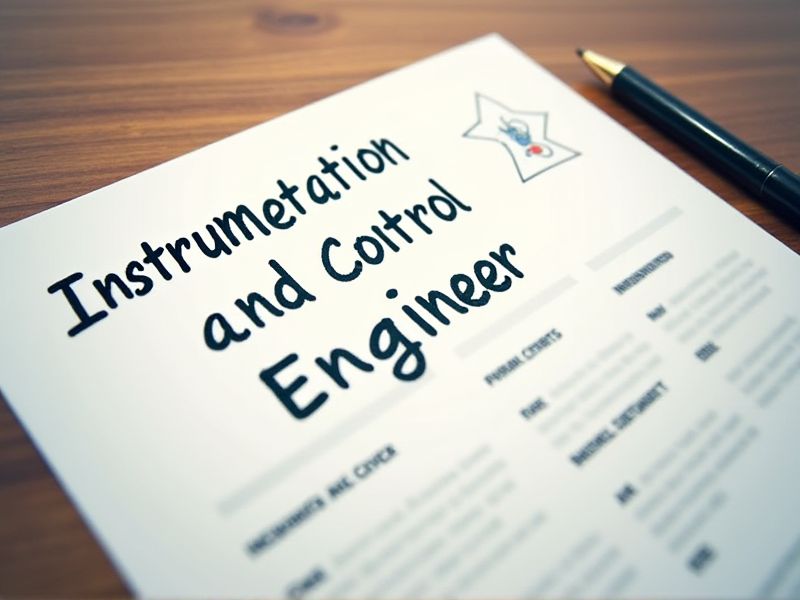
Instrumentation and Control Engineers play a critical role in ensuring the efficiency and safety of automated systems. Certifications help validate their expertise in complex technologies, leading to enhanced job performance and career growth. Employers often demand these certifications to guarantee that their engineers possess the necessary skills and up-to-date knowledge to handle intricate control systems. Here are some key certifications you might consider for a career in Instrumentation and Control Engineering.
ISA Certified Automation Professional (CAP)
The ISA Certified Automation Professional (CAP) designation provides validation of an instrumentation and control engineer's skills, ensuring industry-recognized proficiency. Certification allows engineers to design and implement complex control systems with demonstrated expertise, enhancing both personal credibility and company reliability. Employers prioritize CAP-certified professionals as they tend to drive project efficiency and reduce operational risks. This credential also contributes to potential career advancement and heightened job security in the evolving automation landscape.
ISA Certified Control Systems Technician (CCST)
Having an ISA Certified Control Systems Technician (CCST) enhances an Instrumentation and Control Engineer's credibility and ensures adherence to established industry standards. This certification verifies a professional's technical proficiency in installing, calibrating, and troubleshooting complex control systems, reducing error rates and improving system reliability. Engineers with CCST credentials are often seen as more competitive in the job market, leading to better career opportunities and potential salary increases. Organizations benefit from employing CCST-certified engineers since they bring enhanced efficiencies and safety to projects, aligning with best practice protocols.
Certified Control Systems Engineer (CCSE)
Certified Control Systems Engineers (CCSE) are essential for instrumentation and control engineers to ensure that complex automation systems meet industry standards and safety regulations, which reduces the risk of costly errors. Obtaining a CCSE certification validates an engineer's expertise in design, implementation, and maintenance of control systems, improving their credibility in the field. The certification process keeps professionals updated with the latest technological advancements, fostering enhanced efficiency and innovation in control system projects. CCSE-certified engineers often have a competitive edge in job markets, leading to better career opportunities and progression within the industry.
National Instruments Certified LabVIEW Developer
Having a National Instruments Certified LabVIEW Developer certification ensures proficiency in using LabVIEW, which is essential for designing and implementing control systems in instrumentation. The certification demonstrates a validated ability to troubleshoot and optimize complex systems, improving reliability and performance. Companies often require certified developers to ensure standardized practice and reduce training time. Employing certified professionals can lead to more efficient project completions, providing a competitive advantage in the industry.
Rockwell Automation Certified Programmer
A Rockwell Automation Certified Programmer is essential for an Instrumentation and Control Engineer due to the increasing integration of Rockwell's systems in industrial automation. Certification ensures the engineer possesses the specialized knowledge to effectively program and maintain Rockwell's PLCs, a critical component in automated processes. Proficiency in these systems enables the engineer to optimize operations and troubleshoot efficiently, reducing downtime. With Rockwell's widespread industry presence, the certification enhances employability and professional credibility within the engineering field.
Siemens PLC Programming Certification
Siemens PLC Programming Certification provides a standardized proof of proficiency in using Siemens' programmable logic controllers, which are widely used in industries. Without proper certification, engineers may lack the recognition or validation of their skills in executing PLC-related tasks. Certification increases an engineer's employability by aligning their expertise with industry standards and requirements. Employers often prefer certified professionals, as they indicate reduced training time and faster project deployment.
Honeywell Process Control Certification
Honeywell Process Control Certification enhances an Instrumentation and Control Engineer's proficiency in managing industry-standard automation systems. This certification validates their expertise in configuring and optimizing Honeywell's control solutions, which leads to improved system efficiency and safety. In industries where Honeywell systems are integral, certified professionals are more competitive and effective in addressing complex technical challenges. Industries increasingly prefer certified professionals to ensure reliability and adherence to industry standards, therefore fostering better career prospects.
SCADA Systems Specialist Certification
SCADA Systems Specialist Certification enhances an Instrumentation and Control Engineer's proficiency in managing and optimizing automated systems. Certification provides a standardized understanding of SCADA systems, which is crucial for maintaining system reliability and security. A certified specialist is often considered more competent, increasing opportunities for career advancement and employability. As industries increasingly rely on automation and remote monitoring, certification ensures engineers possess the latest skills to address technological challenges effectively.
Certified Maintenance and Reliability Professional (CMRP)
Obtaining a Certified Maintenance and Reliability Professional (CMRP) enhances an Instrumentation and Control Engineer's capability to implement effective maintenance strategies, thus reducing downtime. The certification equips engineers with the skills necessary to optimize asset management, leading to increased operational efficiency. By understanding industry best practices in reliability, engineers can anticipate equipment failure and proactively address potential issues. CMRP certification also signifies a commitment to excellence and continuous improvement, often leading to career advancement opportunities.
Six Sigma Green Belt Certification
Six Sigma Green Belt Certification equips an Instrumentation and Control Engineer with process improvement techniques, enhancing operational efficiency. This certification enables engineers to systematically identify and reduce defects, therefore increasing the reliability of complex systems. Data-driven decision-making, a core competency of Six Sigma, improves design precision and control system performance. Employers often seek certified professionals as they are associated with better project outcomes and cost savings.
Summary
By obtaining certifications in instrumentation and control engineering, you can significantly enhance your technical skills and understanding. This advancement often leads to increased job opportunities and potential for higher salaries. Employers may view certified engineers as more competent, making you a more attractive candidate for promotions or specialized roles. As your expertise grows, you may also experience greater job satisfaction and confidence in tackling complex engineering challenges.
